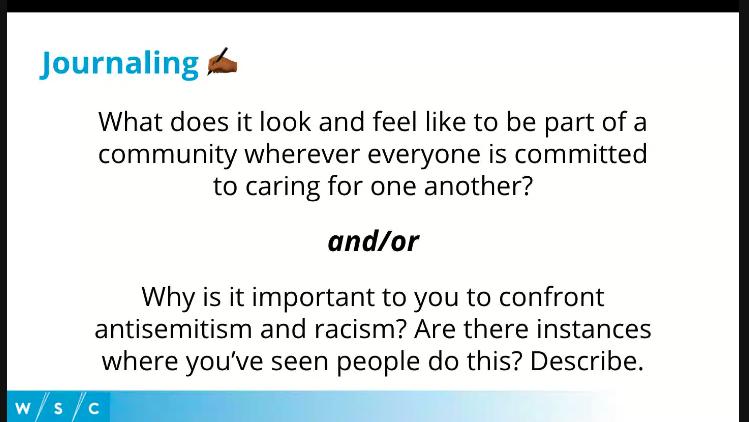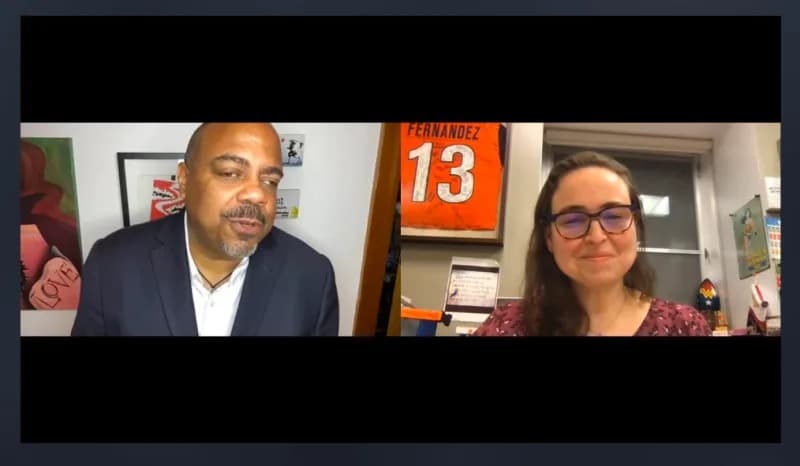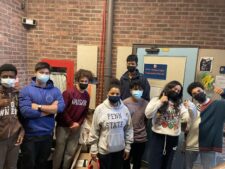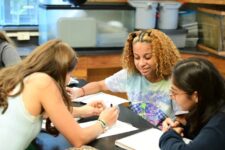Fieldston Awareness Day (FAD) offers Fieldston Upper students, faculty, and staff the opportunity to explore critical themes and ideas outside of the classroom through workshops, discussion groups, and visiting speakers. This year’s FAD, entitled “Living Through a Legacy of Hate: Antisemitism and White Supremacy in the 21st Century,” saw the ECFS community engage with the difficult and necessary truths of bigotry — how to confront and combat it — all in a virtual setting.
As a precursor to FAD, parents/caregivers, faculty, and staff attended a virtual talk the night before with FAD keynote speaker Eric Ward, Executive Director of Western States Center, a Portland, Oregon-based organization centered on racial, gender, and economic justice. Ward spoke about his own experiences with racism and bigotry, and how we can move forward as a nation to confront these issues.
“It’s so critically important to engage our identities and celebrate the multitude of identities we hold,” Ward said. “But it’s important to move out of our silos. Those of us who believe in inclusive communities and inclusive democracy cannot afford to sit in our silos.”
Ward spoke to parents and caregivers about how they can support their children in the fight against antisemitism, racism, sexism, xenophobia, transphobia, and other systems of hate. He encouraged them to spend more time asking young people how they are feeling, and to find out their hopes for the future. He also encouraged parents and caregivers to seek out more connections with one another — to create spaces for difficult but necessary dialogue.

The 2020 FAD kicked off with a pre-recorded video featuring Jason N. ’21, Micaela G. ’21, and Dan B. ’21 introducing Ward and listing his many accomplishments in the fields of racial, social, and economic justice.
Ward began his keynote address, “Leaning Into Your Power: Embracing Inclusion, Diversity, and Equity” by reminding students of their ability to create change. “There are more of us who believe in the world we are trying to create than we are taught to believe,” he said. “We have the creativity, the imagination, and the energy to shape society in a way that fulfills the needs of everyone.”
He acknowledged the many obstacles that stand in the way of change and provided a brief history of bigotry in the United States and the path that it has taken, leading up to the modern white nationalism movement. Ward explained how antisemitism, and the history of hatred and violence towards the Jewish community, is directly tied to the rise of white nationalism. “White supremacy is written on the paper of anti-Black racism,” explained Ward. “But white nationalism is written on the paper of antisemitism.” He warned students about the importance of combatting all forms of bias, noting that, “Antisemitism doesn’t merely put the Jewish community in danger. It puts all of us in danger.”
Ward ended his talk with a call to action for students: “Keep doing the work of challenging racism,” he said. “But stop spending your time on who is a racist, and start asking the question of why something is racist. Racism is a system — it’s not about individuals. We have to focus on systemic change.”
Following the keynote address, students broke into affinity groups based on how they self-identify. In those groups, students and faculty were able to process and discuss Ward’s message in a smaller setting amongst their peers. Following the affinity group meetings, students split into self-selected workshops in which both visiting speakers and ECFS faculty led discussions on various topics surrounding antisemitism.
In each virtual workshop, students listened to presentations by the featured speakers before breaking into smaller discussion groups. Throughout each session, students were encouraged to use the chat feature of Google Meet to share their feelings, express their reactions towards the presentation, and ask questions.
In one workshop, “Antisemitism, Racism, and Extremism: Understanding and Talking about the Intersections,” led by Jessica Acee and Marley Pierce of the Western States Center, over 150 students, faculty, and staff gathered together over Google Meet to build upon the themes addressed in Ward’s earlier talk. Students were asked to post in the chat about their takeaways from the FAD so far and what they hoped to learn more about. Caroline M. ’24 noted that she learned more about “how antisemitism has an intersection with racism.” For Catherine H. ’22, a takeaway was that “all minorities will never be free of oppression if one minority group is still being oppressed.”

In an afternoon workshop, “Skills for Better Conversations Across Lines of Difference,” led by Eliza O’Neil from the Seeds of Peace organization, students learned tools for holding positive and productive conversations, even when the subject matter is difficult or uncomfortable.
Using the Google Meet chat feature, the group of over 100 students, faculty, and staff reflected on why they chose to attend this workshop and what value they see in learning how to have better conversations with others. Genevieve P. ’24 explained that she chose this workshop “because of the political and social relevance.” She went on to say, “I am very interested in learning how to engage in meaningful and civil conversations with people who think differently than me.”

Throughout the workshop, attendees learned about a specific framework for creating these meaningful conversations and why these conversations are important in the first place. After spending the first part of the FAD learning about the history of antisemitism and the intersections between various forms of bigotry, students, faculty, and staff were able to walk away with concrete tools for fostering change, one conversation at a time.
As Ariel A. ’21 noted: “It’s very difficult to create change or make progress if everyone is fighting each other.”
The 2020 Fieldston Awareness Day provided ECFS students, faculty, and staff the opportunity to reflect on difficult and necessary truths of hatred and bigotry in the United States. While the format may have looked different this year, that didn’t stop the School from engaging in thought-provoking workshops, meaningful discussions, and affirming affinity group spaces.



